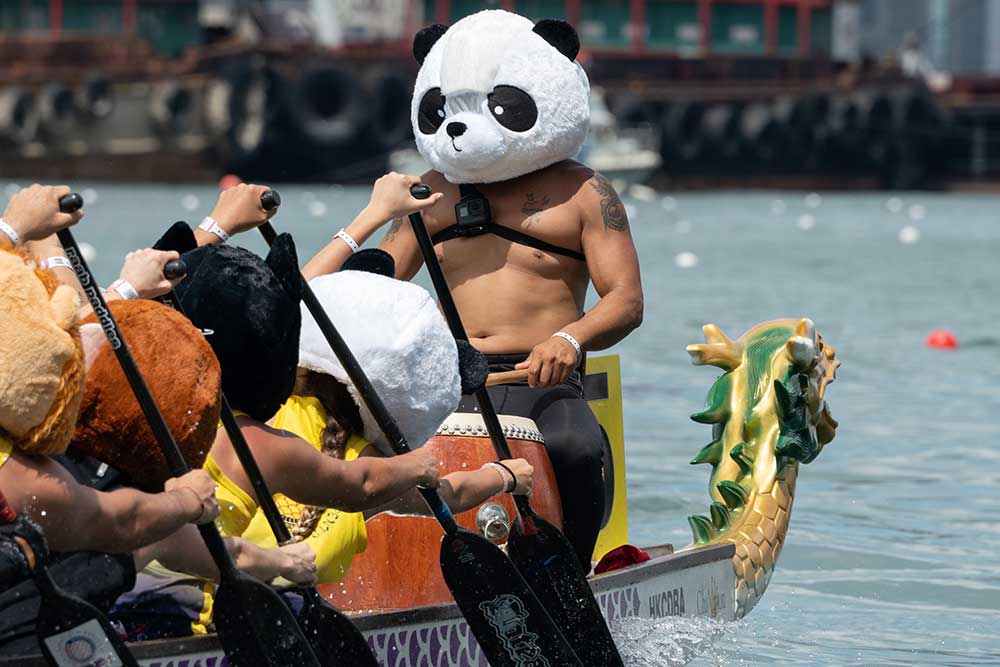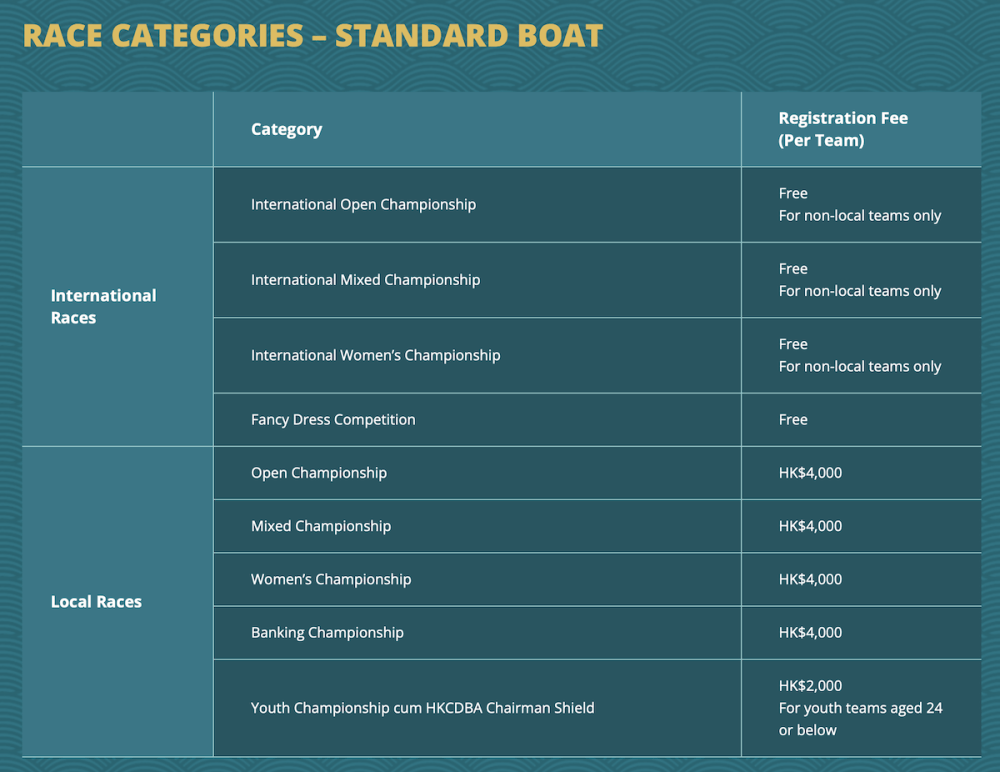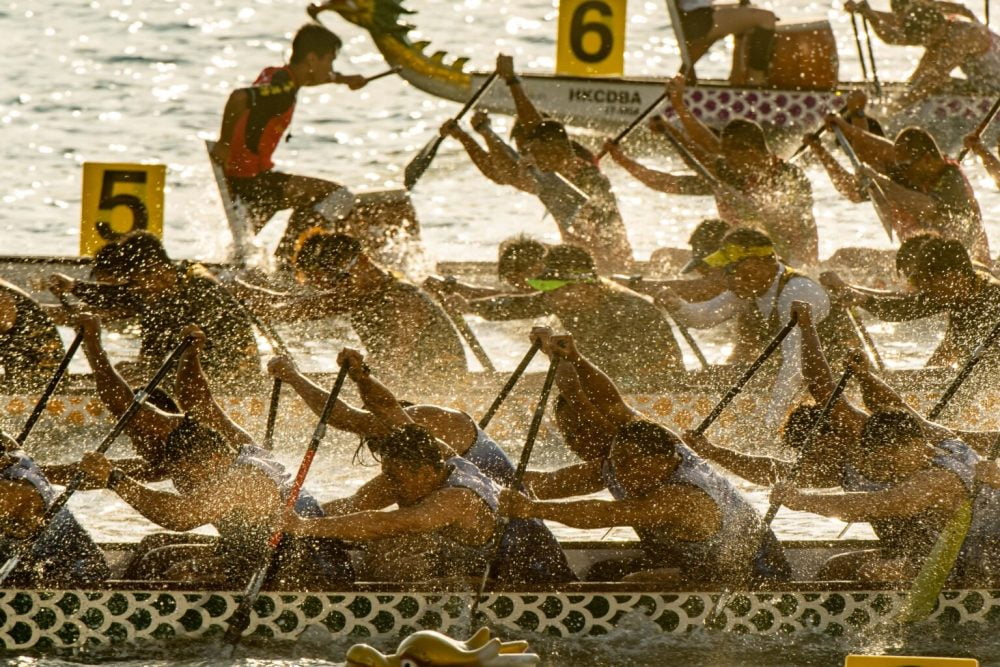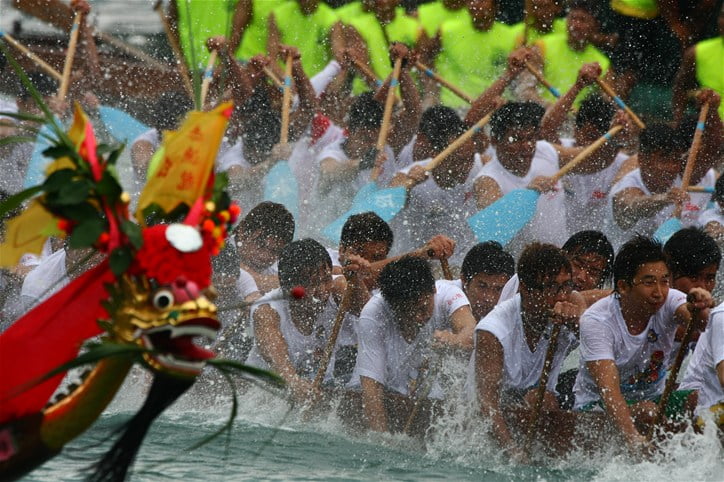
Celebrated on the fifth day of the fifth lunar month, Tuen Ng Festival is, in the minds of many, associated with the annual dragon boat races. However, zongzi (steamed glutinous rice ‘dumplings’ with various fillings wrapped in bamboo leaves) are also an important Tuen Ng tradition. bc magazine takes a look at two of the Tuen Ng traditions that are now enjoyed by people around the world.
When the Chu poet and statesman Qu Yuan (340 – 277 BC) threw himself into the Miluo river (in what is now Hunan province), in protest of the Qin army’s capture of the Chu capital, the villagers raced out on their boats to try and save the poet, but were unable to even retrieve his body from the river. In an effort to prevent the fish from devouring the dead poet’s corpse, people threw rice dumplings to feed the fish and also beat the water’s surface with their paddles in order to frighten the fish away from Qu Yuan’s body. These actions led to two of the most enduring traditions associated with Tuen Ng Festival: dumplings (zongzi) and dragon boat racing.
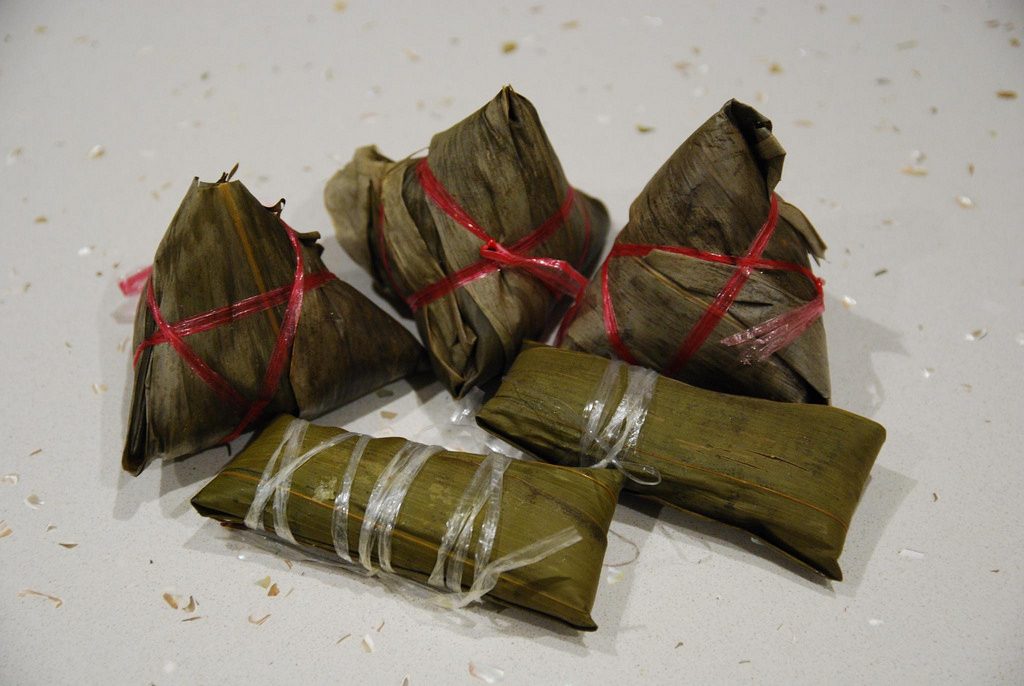
Zongzi
For many Chinese, zongzi is a far more memorable part of Tuen Ng festival than dragon boat racing. Not everyone takes part in dragon boat races, but almost all Chinese families eat dumplings every year at this time of year. Traditionally, zongzi were made at home, but nowadays most people buy them instead. Although zongzi are easy to make, the preparation is extremely time-consuming. Because of the extensive preparation involved, the whole family took part in making the zongzi. The glutinous rice must first be soaked overnight in water and the bamboo leaves also have to be washed and soaked, while the fillings must also be prepared. Zongzi (steamed rice dumplings) consist of glutinous rice stuffed with a sweet or savory filling, wrapped in bamboo leaves into a roughly pyramidal shape and tied with string. They are then boiled for about 2 hours.
Zongzi were at first eaten only once a year on the day of the festival, but nowadays, due to the popularity of the dumplings, convenient ready-made zongzi are available year-round at supermarkets and restaurants. Variants such as pearl chicken (glutinous rice stuffed with chicken and wrapped in lotus leaves) are also a popular staple on the dim sum menu.
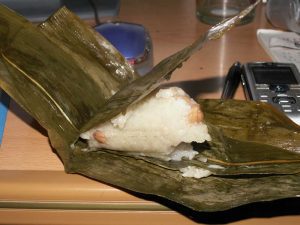 There are myriad varieties of filling available: in northern China, dates are popular; in Shanghai, dumplings are stuffed with soy sauce marinated fatty pork and salted egg. Here in southern China, zongzi are stuffed with pork as well as mung beans and other fattening fillings. In Hong Kong, “deluxe” zongzi with abalone, conpoy and other expensive delicacies are also available. Not only do the fillings differ from region to region, the way people enjoy zongzi is also different. In Shanghainese households, savory dumplings are dipped in sugar before eating, while in the south, zongzi are dipped in soy sauce. “Never, ever, dip your zongzi in soy sauce. We’re from Shanghai and we dip our zongzi in sugar” was an oft-repeated admonishment from my childhood. Each region of China makes zongzi differently and each is convinced that their own zongzi are better than the others. There are also sweet zongzi, stuffed with items like red beans and lotus seed paste.
There are myriad varieties of filling available: in northern China, dates are popular; in Shanghai, dumplings are stuffed with soy sauce marinated fatty pork and salted egg. Here in southern China, zongzi are stuffed with pork as well as mung beans and other fattening fillings. In Hong Kong, “deluxe” zongzi with abalone, conpoy and other expensive delicacies are also available. Not only do the fillings differ from region to region, the way people enjoy zongzi is also different. In Shanghainese households, savory dumplings are dipped in sugar before eating, while in the south, zongzi are dipped in soy sauce. “Never, ever, dip your zongzi in soy sauce. We’re from Shanghai and we dip our zongzi in sugar” was an oft-repeated admonishment from my childhood. Each region of China makes zongzi differently and each is convinced that their own zongzi are better than the others. There are also sweet zongzi, stuffed with items like red beans and lotus seed paste.
Sweet & sour chicken isn’t the only culinary gift that Chinese cooking has given the world: zongzi are also eaten in Japan, Burma, Vietnam, Thailand, the Philippines, and even Mexico. From their humble origins as fish food, zongzi have become part of a global culinary tradition.
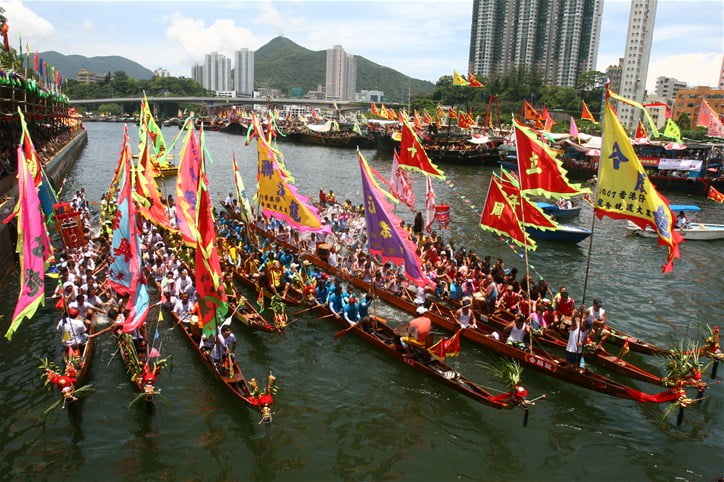
Dragon Boats
Like zongzi, dragon boat races were once only held at Tuen Ng festival but are now held year-round. Just as with zongzi, dragon boat races have developed and evolved into global sporting events. The International Dragon Boat Federation estimates that nearly 50 million people take part in dragon boat races annually. Even with the increased commercialisation of the events, the dragon boat races still embody values of teamwork, solidarity and tradition that pay fitting tribute to the patriot Qu Yuan.
Dragon boat racing has become so much more than a group of villagers honouring a dead patriot. At Stanley Main Beach, the celebration of Tuen Ng festival is firmly based in the 21st century, having evolved into an important sporting and social event. The internationally famous event attracts thousands of spectators through the day looking to enjoy the spectacle. Although technically an amateur event many teams have commercial sponsors, compete in the various competitions across the city and start practicing months in advance as paddlers from across the globe hone their skills.
Dragon boat racing is very much a team sport. It’s easy for beginners to learn how to paddle, but it takes time to synchronise a whole team’s rhythm. Even though it’s supposedly a fun event at the beach it’s also fiercely competitive – which fosters a sense of camaraderie within and across teams.
Despite its having become a major international sport, dragon boat racing has an uniquely Asian cultural heritage and it’s sad that some participants are unaware of the details of the story of Qu Yuan. However, it isn’t necessary to know the background of the Tuen Ng festival to enjoy the festive spirit that eating zongzi and taking part or watching dragon boat races bring – and that is what’s important about Tuen Ng: that sense of community.
Stanley International Dragon Boat Championships
Date: 10:30am, 9 June, 2016
Venue: Stanley Main Beach
Tickets: Free
Dragon Boat Carnival
Date:10-12 June, 2016
Venue: Central Harbourfront
Tickets: Free
More info:
10 June – 12pm to 5:30pm
11-12 June – 8:30am to 5:30pm
This article was published in the print edition of bc magazine

